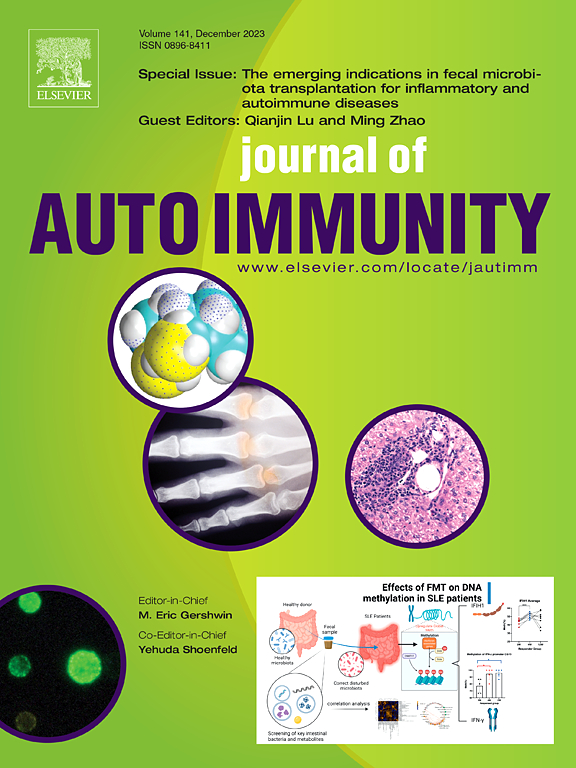The role of gut flora-driven Th cell responses in preclinical rheumatoid arthritis
IF 7
1区 医学
Q1 IMMUNOLOGY
引用次数: 0
Abstract
Rheumatoid arthritis (RA) is a chronic autoimmune inflammatory disorder with an immune pathogenesis that evolves over decades. Preclinical RA (PreRA) represents a dynamic immune phase preceding clinical RA, marked by the loss of autoimmune tolerance, the appearance of tissue-invasive effector T cells, and the production of autoantibodies (such as antibodies against citrullinated proteins and rheumatoid factors). Extensive research has demonstrated that gut microbiota influence mucosal T-cell responses, driving the progression of PreRA through multiple mechanisms, including altered intestinal permeability, gene-environment interactions, bacterial antigenic specificity, molecular mimicry, and metabolite production. Environmental risk factors such as smoking, hormonal changes, and high-sodium (Na) diets, may contribute to RA pathogenesis via the gut microbiome. The next challenge in RA research lies in developing therapeutic strategies to intervene during the asymptomatic autoimmune phase, where dietary adjustments, natural compounds, probiotics, and other approaches could effectively modulate gut flora to prevent or delay RA onset.
肠道菌群驱动的细胞反应在临床前类风湿关节炎中的作用
类风湿性关节炎(RA)是一种慢性自身免疫性炎症性疾病,其免疫发病机制已经发展了几十年。临床前RA (preera)代表临床RA之前的一个动态免疫阶段,其标志是自身免疫耐受性的丧失,组织侵入效应T细胞的出现,以及自身抗体的产生(如针对瓜氨酸蛋白和类风湿因子的抗体)。大量研究表明,肠道微生物群影响粘膜t细胞反应,通过多种机制推动prea的进展,包括肠道通透性改变、基因-环境相互作用、细菌抗原特异性、分子拟态和代谢物产生。环境风险因素,如吸烟、激素变化和高钠饮食,可能通过肠道微生物群促进RA发病。RA研究的下一个挑战在于制定治疗策略,在无症状自身免疫阶段进行干预,其中饮食调整,天然化合物,益生菌和其他方法可以有效调节肠道菌群,以预防或延迟RA发作。
本文章由计算机程序翻译,如有差异,请以英文原文为准。
求助全文
约1分钟内获得全文
求助全文
来源期刊

Journal of autoimmunity
医学-免疫学
CiteScore
27.90
自引率
1.60%
发文量
117
审稿时长
17 days
期刊介绍:
The Journal of Autoimmunity serves as the primary publication for research on various facets of autoimmunity. These include topics such as the mechanism of self-recognition, regulation of autoimmune responses, experimental autoimmune diseases, diagnostic tests for autoantibodies, as well as the epidemiology, pathophysiology, and treatment of autoimmune diseases. While the journal covers a wide range of subjects, it emphasizes papers exploring the genetic, molecular biology, and cellular aspects of the field.
The Journal of Translational Autoimmunity, on the other hand, is a subsidiary journal of the Journal of Autoimmunity. It focuses specifically on translating scientific discoveries in autoimmunity into clinical applications and practical solutions. By highlighting research that bridges the gap between basic science and clinical practice, the Journal of Translational Autoimmunity aims to advance the understanding and treatment of autoimmune diseases.
 求助内容:
求助内容: 应助结果提醒方式:
应助结果提醒方式:


